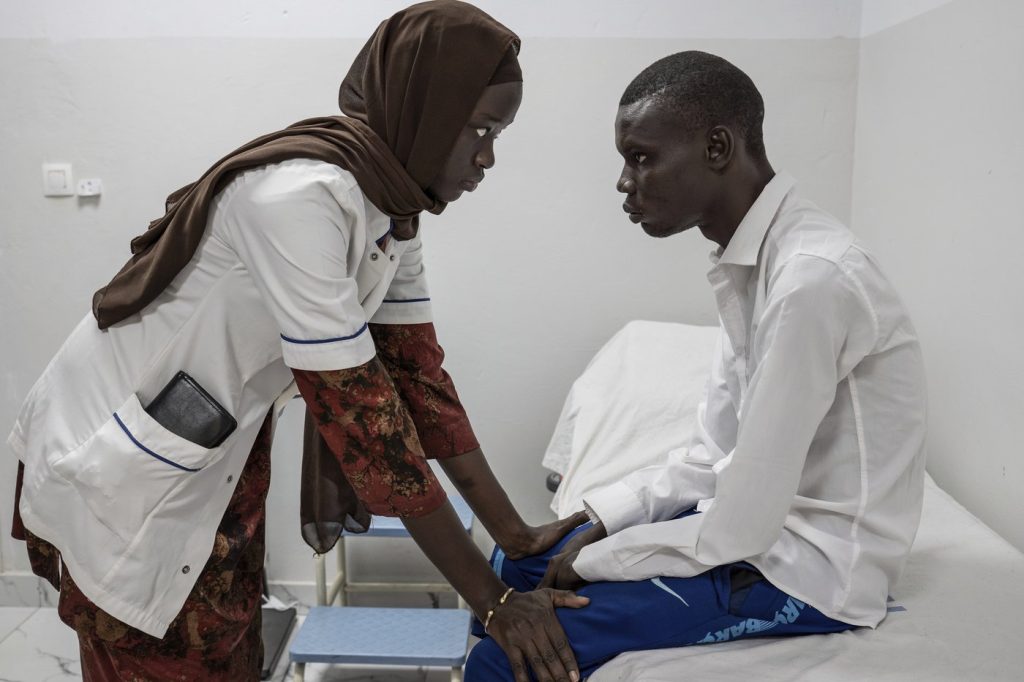DAKAR, Senegal (AP) — Ndeye Lam frequently visits the cemetery, where she prays and gently touches the seashells placed on her daughter Mariama’s gravesite. “Mariama will always be here,” she said, reflecting on her daughter’s short life. At home, Lam and her husband Pathé watch old videos of Mariama celebrating her 13th birthday, a stark contrast to the struggles she faced as her health deteriorated due to a muscular dystrophy condition identified as SELENON-related myopathy.
As Mariama's muscles weakened and she dealt with increased breathing difficulties, her visits to Fann hospital in Dakar became more frequent. Neurologist Dr. Pedro Rodriguez suspected that a new BiPAP machine could have alleviated her respiratory distress, but it was too late to help. Worldwide, over 350 million people live with rare diseases, often influenced by genetic anomalies. While some conditions can be treated early, many in Africa remain undiagnosed due to a lack of resources and data.
Rodriguez aims to change this landscape by facilitating genetic testing and medical support. He emphasizes that most data concerning rare diseases originates from individuals of European ancestry, indicating a significant knowledge gap regarding other regions, particularly in Africa. His research is supported by organizations such as the La Caixa Foundation in Spain and the National Ataxia Foundation in the United States, and he collaborates with scientists across the globe to accumulate vital genetic data.
Genetic testing has proven life-saving for many patients in Senegal. In Guediawaye, for instance, Fatoumata Binta Sané's daughter, Aissata, suffers from glutaric acidemia type I, which severely restricts her mobility and communication abilities. While newborn screening for genetic conditions is routine in countries like the United States, it is not yet widespread in Senegal. Infants who seem healthy may go undetected, leading to irreversible health complications if conditions like Aissata's are not treated promptly.
Sané currently awaits genetic testing results for Aissata’s one-year-old sister, Aminata. Early diagnosis can lead to successful treatment outcomes and significant improvements in life quality; however, ongoing treatment can be expensive and requires government assistance if Aminata shares her sister’s condition. Dr. Moustapha Ndiaye, head of the neurology department at Fann, envisions a future where young medical professionals in Africa are adequately trained to support patients with rare diseases.
Dr. Henriette Senghor, who is currently training with Rodriguez, says there was a significant gap in knowledge regarding the causes of uncommon ailments. In 2021, Rodriguez partnered with Cheikh Anta Diop University in Dakar to collect data from patients while sending blood samples to Barcelona for analysis. Nearly 1,300 individuals have participated in this groundbreaking study focused on rare diseases in West Africa.
Families across borders seek care for their children. In the Gambia, Fatou Samba’s sons Adama and Gibriel are both undergoing treatment for genetic conditions. Adama was diagnosed with Duchenne muscular dystrophy, a progressive disorder that, without timely intervention, leads to severe mobility limitations and other health problems. Prompt diagnosis and medication have reportedly improved Adama's condition.
At Fann Hospital, patients like Woly Diene, who suffers from riboflavin transporter deficiency, benefit from timely diagnosis. Following her diagnosis in August 2023, high doses of vitamin B2 have shown potential to reverse some damage, allowing Diene to regain mobility after severe setbacks. While the cost of ongoing treatment remains a concern, her family is committed to ensuring she receives the necessary care.
Rodriguez’s research is vital not only for individual patient care but also for accumulating data essential for rare disease research and treatment development. A $50,000 grant has allowed his team to enroll patients from Senegal and Nigeria with inherited ataxias, highlighting the ongoing challenges and funding limitations in rare disease research. Although cuts in USAID funding have not hindered their work yet, Rodriguez, Senghor, and Dr. Rokhaya Ndiaye continue to strategize for the sustainability of genetic testing initiatives in Senegal, emphasizing the importance of global collaboration and strengthening local healthcare infrastructure.











